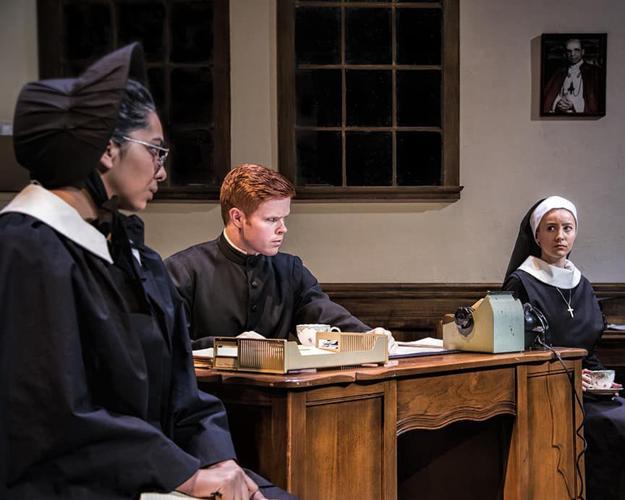Brace yourself.
If you plan to see Arizona Repertory Theatre’s “Doubt, A Parable” — and you should — do not expect a cheery production.
It’s reasonable to expect one: playwright John Patrick Shanley has a deft hand with comedy. And there are some funny moments in this.
But more than anything, there’s horror about a nun who is intractable, cold and convinced that the priest at the school where she is principal has molested a young boy. And horror about a priest who may have done what she is sure he has done, though she has no proof.
The time is the mid-’60s. The Catholic Church is going through changes thanks to Pope John Paul XXIII’s Vatican II, which has modernized and liberalized the church’s practices.
The principal, Sister Aloysius (Marissa Salazar), is not happy about the “new” church. On the other hand, Father Flynn (Alec Williams), the school’s priest, embraces it fully.
Those who went to Catholic schools in the ‘60s will immediately recognize Sister Aloysius. She assumes guilt before she’ll consider innocence, her students are deathly afraid of her and that’s the way she likes it. Enthusiastic teaching has no place in her school.
And Salazar never lets up. She made the nun so real that there was a great temptation to defy her by chewing gum, talking out of turn and wearing short skirts (all things that a Sister Aloysius would punish severely).
Father Flynn is also someone Catholic children of the era will recognize. He has great compassion, a strong intellect and demands that we question rather than accept blindly. Williams’ priest was the best work we’ve seen the University of Arizona senior do — and he has done plenty of good work while attending the school. He was so immersed in the character that the audience was, too. I had to stop myself from making the sign of the cross with him at the end of one of the powerful sermons he delivered.
Anza Keller’s young and hopeful novice, Sister James, was heartbreaking. You could see her withdraw as Sister Aloysius insists that she treat her students more cooly and with much less empathy.
Adia Bell gave a fierceness to her Mrs. Muller, the mother of the young African-American boy the principal thinks has been a victim of Father Flynn’s behavior.
Director Hank Stratton has packed this production with tension and passion. The pace was languid — Stratton made sure the play breathed enough for the story and the words to sink in — yet the 90-minute play felt much shorter.
Clare P. Rowe’s impressive set design flowed easily from an office to a garden to a church. Brie Gonzalez’s lighting brought us to each location with a grace.
It’s easy to see the relevance of this play in light of the abuse and cover-up of it in the Catholic Church. But it also resonates in this way: accusations without proof and thrown about freely can destroy people.
We see it in our politics daily. In the world of social media, those accusations can be even more devastating — few seem to care if they are true or not. It’s chilling.
In 2005, “Doubt, A Parable,” won a Tony for best play, and a Pulitzer. It is a powerful piece of theater. This University of Arizona production more than does it justice.





